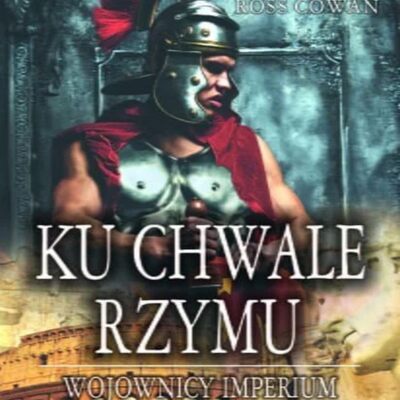The book “For the Glory of Rome: A History of Warriors and Warfare” by Ross Cowan is a position showing the military aspect of the Roman army and trying to present the Romans as individual warriors who fought duels with the enemy, not an organized war machine.
The author based his considerations on the following chapters, in which he analyzes the combat value of the Roman army. In the beginning, we are shown the period of the wars between Rome and Pyrrhus (280-275 BCE), in which the “sons of the wolf” face the professional army of Hellenes from the east for the first time. Roman troops fought with previously unknown war elephants and an army led by a genius of strategy and military of that time. Hannibal himself (the victor of Cannae) highly valued Pyrrhus, whom he considered his teacher.
The conflict between Epirus and Rome arose from the request of Taranto and other Greek cities from the south of the Apennine Peninsula for help from Pyrrhus. Rome gradually dominated and threatened the next independent Greek cities on the Peninsula, which raised legitimate concerns about their future. Pyrrhus decided to build his Empire on the victory over the Romans, taking advantage of the aforementioned request for help and getting involved in the affairs of Italy. Certainly, but he was surprised when it turned out that the Romans, despite their defeats, are able to constantly recruit new soldiers. The Roman legions can be compared here to a hydra whose head is cut off and new ones grow in its place. By describing the war between Rome and Pyrrhus, the author wanted to emphasize the basic advantages of the Roman army: its perseverance (regeneration), honor (e.g. dismissing the traitor Pyrrhus), professionalism (maintaining the line and efficiency), steadfastness (they did not give up despite successive defeats). Apparently, Pyrrhus himself was to say that by having Roman legionnaires in his army, he would be able to conquer the whole world.
In the next chapter, the author “proves” through a number of examples that the extremely pious Romans won with the support of the gods. Visions, vows, and above all devotio (“sacrifice”) were used for this purpose, which allowed the commander of the army to give his life in exchange for defeating the enemy and reversing the unfavorable fate of the battle. As the author himself emphasizes, such a deep faith and conviction of the Romans about their uniqueness (sons of the god of war Mars) gave them strength and pushed them towards greater victories.
Certainly one of the most interesting fragments of the book is the one devoted to the duels of Roman warriors. The author, through numerous sources, evokes the tradition of fighting duels between the bravest warriors of the opposing sides. What is important, however, Roman authors most often showed the Roman side in this worse situation. The Roman was usually short in stature and faced a powerful opponent. Thus, the victory was even greater, and the morale of the army was growing and it was said that sometimes it decided the outcome of the battle. The author proves here how important dueling was in Roman times – popular in the ancient world – which somewhat disturbs our view – identifying the legionnaire with the whole legion.
The author also touches on the aspect of the importance of the commander in the Roman army, which in the 1st century BCE fought not for reasons of state, but for their leader. It was Caesar or Pompey who guaranteed loot and slaves to their subordinates, not the Senate or the people of Rome. This fact caused the attachment of soldiers to their leaders, the increase in the ambitions of politicians, and indirectly also the crisis of Roman statehood. On the other hand, the Roman legionnaires achieved great victories at that time and became an incredibly effective war machine.
The author also allows us to look at Roman warriors from a “closer perspective”, observing battle insults, motivating his troops, despising the enemy, and above all, trying to relieve deadly work.
Ross Cowan’s position is certainly an attractive position for every enthusiast of the ancient military, especially Roman. The author, based on numerous sources, tries to emphasize the advantages of the Roman army and highlight the individual warring “sons of the Wolf”. Using historical messages and preserved artifacts, he shows us the world of a private and the profiles of warriors. On the plus side, you must certainly provide interesting graphics inside the book, the setting of the position itself, and a wide bibliography. On the downside, unfortunately, we should mention the fact that footnotes are placed at the end of the book, which makes it difficult for us to explore further content.
To sum up, I would certainly recommend this position, taking into account the substantive value and the extremely interesting topic of the Roman military. The power of the Roman legions and their professional organization has been an unsurpassed model for many nations for centuries. Here we have the opportunity to look a little more at the rank and file of Rome’s legionaries.


